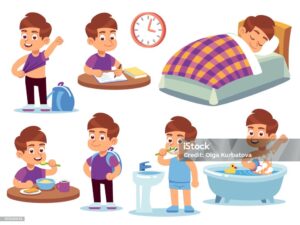The holidays can be a challenge due to the excitement, disruptions to routine, and increased stimuli. Help your child manage their emotions and excitement during the holidays while also enjoying the festivities. Here are some practical strategies to help keep things manageable.

1. Set Clear Expectations To Help Your Child Manage Their Emotions
- Talk Ahead of Time: Let your child know what to expect in advance, whether it’s visitors, travel, or different activities. Setting expectations helps reduce anxiety and confusion.
- Use Simple Rules: Reinforce behavioral rules, like using indoor voices, being gentle with toys, or waiting for turns. Make these rules simple and easy to remember.
2. Maintain a Routine To Help Your Child Manage Their Emotions
- Stick to Bedtime: Excitement can make it harder for kids to go to sleep, but a good night’s rest is essential for managing behavior. Try to keep bedtime routines consistent.

- Regular Meals: Keep mealtimes and snack times as consistent as possible to avoid hunger-driven tantrums or irritability.
- Calm Breaks: Build in quiet moments during the day where your child can relax and reset, like reading time or a calming activity.
3. Provide Outlets For Energy To Help Your Child Manage Their Emotions
- Physical Activities: Make sure your child has time to burn off energy through active play, whether inside or outside. Consider games, dancing, or a trip to the park.
- Sensory Breaks: Create opportunities for sensory play, such as playing with dough, building blocks, or water play, which can help ground and calm.
4. Manage Overstimulation To Help Your Child Manage Their Emotions 
- Limit Overstimulation: Holidays often bring a lot of noise, lights, and people. Try to find a quiet space where your child can retreat to recharge when they start to feel overwhelmed.
- Simplify Decorations: Bright lights and too many decorations can be overwhelming. Consider limiting the intensity of decorations in areas your child spends time in.
5. Positive Reinforcement To Help Your Child Manage Their Emotions
- Praise Positive Behavior: Celebrate calm and well-behaved moments with praise or small rewards. This can encourage your child to repeat positive actions.
- Set up a Reward System: For challenging days, create a simple reward chart to encourage your child to stay calm, share, or follow directions.
6. Prepare for Social Interactions To Help Your Child Manage Their Emotions
- Teach Social Skills: Remind your child about appropriate behavior with relatives, like saying “please” and “thank you” or sharing toys with cousins.
- Role Play: If your child is nervous or unsure about meeting new people, role-playing can help. Practice greetings, sitting at the table, or sharing with others.

7. Proactive Communication To Help Your Child Manage Emotions
- Redirection: If your child’s behavior is becoming too excitable or disruptive, try redirecting them to a different activity that they can focus on. Activities may include legos, coloring, crafting, games.
- Model Calmness: Children learn a lot from observing adults. If you stay calm and patient, they’re more likely to mirror that behavior.
- Check In Regularly: Keep an eye on how your child is feeling throughout the day, especially during parties or outings. Are they getting too tired? Do they need a break?
- Talk About Emotions: Normalize the fact that they may feel a variety of emotions during this time of year. Remind them how to calm themself should they feel overstimulated.
- Designate Safe Zones: Have a quiet corner with calming toys, books, or a cozy chair. This is especially helpful when your child starts to get overstimulated or frustrated. Click here for ways to create calming zones.
- Click here for ways to create a calming corner and to access additional information on coping strategies for both you and your child.
By combining structure, fun activities, and gentle reminders, you can help your child manage their excitement and enjoy the holiday season without feeling overwhelmed.
Start Therapy to Help Your Child Regulate Their Emotions in Columbia, MD
If you want to get additional support then we can help. Our Columbia therapists specialize in treating anxiety. We can help them learn valuable skills that will help them cope in healthy ways throughout their life. Follow these steps to get started.
- Reach out for a free consultation at our Columbia area therapy practice
- Schedule your first appointment for therapy
- Then, learn how to navigate symptoms of anxiety, work through stressors and improve your overall quality of life
Other Therapy Services We Offer in Maryland & the Washington DC Area
At Crystal Waters Counseling Centers we offer a variety of in-person and online therapy services. Specifically, they are available for children, teens, college students, women, and adults throughout Maryland. In addition, this includes counseling for both anxiety and depression as well as EMDR Therapy, therapy for life transitions, and parent coaching.
